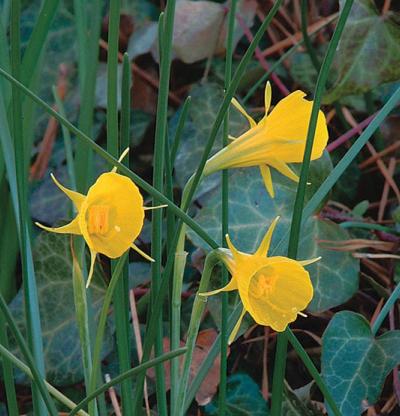





 Daffodil (Narcissus bulbocodium var. conspicuus)
nar-SIS-us
Genus:
Narcissus
The species daffodil N. bulbocodium var. conspicuus (Zones 3–9) has been around so long that no one can actually put a date on it. Its look is unusual: It does have six golden petals, but they are tiny, twisted, and often difficult to see. Its prominent rounded cup gives rise to its nickname, hoop petticoats. It prefers acidic soil and when happy, will reseed, blooming like buttercups in groups. Only 4 to 6 inches tall, it naturalizes itself in many areas.
Care:
Grow in average, well-drained soil in full sun or partial shade. In autumn, plant bulbs from 1.5 to 5 times the bulbs' height (3 inches or more in cold climates). Under glass, grow in 1 part grit and 2 parts soil mix. Deadhead seed heads (except those of species, for dispersal) and allow leaves to photosynthesize for 6 weeks before cutting back, including plantings in turf. Lift and divide clumps if they become overcrowded or perform poorly.
Propagation:
Daffodil (Narcissus bulbocodium var. conspicuus)
nar-SIS-us
Genus:
Narcissus
The species daffodil N. bulbocodium var. conspicuus (Zones 3–9) has been around so long that no one can actually put a date on it. Its look is unusual: It does have six golden petals, but they are tiny, twisted, and often difficult to see. Its prominent rounded cup gives rise to its nickname, hoop petticoats. It prefers acidic soil and when happy, will reseed, blooming like buttercups in groups. Only 4 to 6 inches tall, it naturalizes itself in many areas.
Care:
Grow in average, well-drained soil in full sun or partial shade. In autumn, plant bulbs from 1.5 to 5 times the bulbs' height (3 inches or more in cold climates). Under glass, grow in 1 part grit and 2 parts soil mix. Deadhead seed heads (except those of species, for dispersal) and allow leaves to photosynthesize for 6 weeks before cutting back, including plantings in turf. Lift and divide clumps if they become overcrowded or perform poorly.
Propagation:
Separate bulbs and replant in early summer or early fall.
Problems:Narcissus bulb fly, narcissus nematode, bulb scale mite, slugs, narcissus basal rot, other fungal infections, narcissus yellow stripe virus, and other viruses.
Copyright © www.100flowers.win Botanic Garden All Rights Reserved